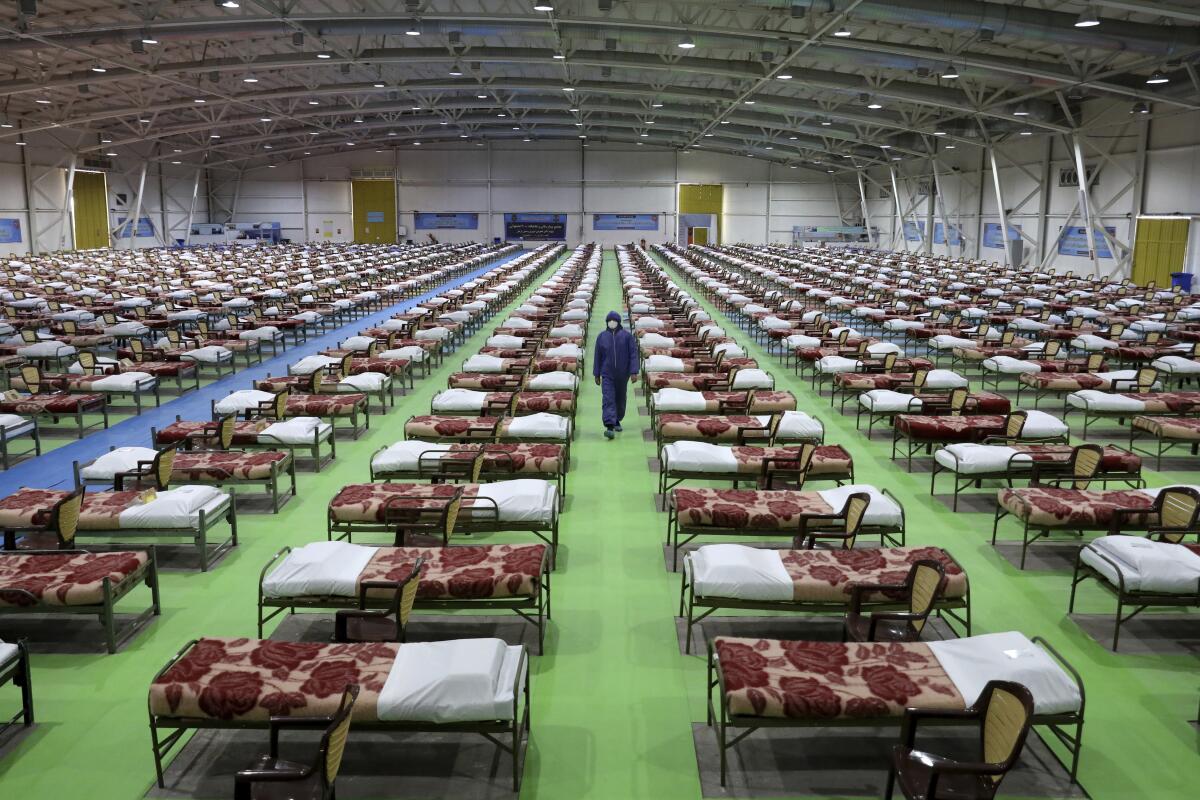Column: Iran needs medical supplies. Trump should help

WASHINGTON — Iran’s incompetent, authoritarian regime failed to react quickly when the coronavirus arrived early this year.
It initially denied that an outbreak was underway and delayed countermeasures until a parliamentary election was over. Then it dissolved into internal bickering.
The results are tragic: at least 70,000 infections and more than 4,300 dead — and those official figures are almost certainly too low.
It would have been nice if the outside world had rallied to offer help — and some tried to.
But Iran’s theocratic leaders are prickly and paranoid. When Doctors Without Borders, the international medical aid group, sent a team to help, officials accused the doctors of being Western spies and expelled them.
The Trump administration, meanwhile, has remained in a virtual state of war with Iran.
In 2018, President Trump abrogated the 2015 nuclear deal negotiated by President Obama and imposed crippling economic sanctions on Tehran. The two countries have collided all over the Middle East, from Iraq to Yemen. Trump and his secretary of State, Michael R. Pompeo, regularly excoriate Iran as a terrorist regime that must be brought to heel.
So when Trump offered publicly to send U.S. aid to Tehran, nobody was surprised when Iran’s supreme leader, Ayatollah Ali Khamenei, said he didn’t want American help.
And when Iran asked the International Monetary Fund for a $5-billion loan to help keep the economy afloat during the pandemic, nobody was surprised when the Trump administration blocked the funds.
When Iran asked for relief from U.S. sanctions, Pompeo called the idea “a scam.”
In a statement that came close to gloating, he added, “The Iranian leadership is trying to avoid responsibility for their grossly incompetent and deadly governance.”
This is a poisonous relationship, and both governments are behaving badly.
I hold no brief for Iran, which I covered after the 1979 Islamic Revolution. Its regime is brutal, repressive and corrupt. The Trump administration is under no moral obligation to send cash to Tehran.
But U.S. sanctions don’t just prevent Iran from selling oil, its only major source of foreign income. They don’t only stop Iran from buying weapons or nuclear technology.
They also make it difficult for Iran to buy food, medicine and medical supplies on the open market — which is what Tehran needs now.
On paper, the sanctions allow exceptions for humanitarian aid, mainly food and medical goods. Pompeo and other U.S. officials point to those clauses as proof of their benevolence toward Iran’s beleaguered people.
But that’s not how the sanctions — which cover foreign companies as well as U.S. businesses — work in practice.
“The rules are complicated, and businesses that run afoul of them can incur huge penalties,” Richard Nephew, who helped administer the system during the Obama administration, told me.
“The risks of engaging in this trade are high,” he added. “The costs are high, too. And the benefits are pretty marginal.”
There are easier ways for a medical supply company to make a profit — especially during a pandemic that already has taken more than 100,000 lives.
And for most international banks, shipping companies and insurers, humanitarian shipments to Iran are too small to be worth the risk.
That helps explain why applications for special permits to sell medicine and medical equipment to Iran have plummeted since Trump took office — from 176 in the last quarter of 2016 to 24 in the last quarter of 2019.
One more wrinkle: The regulations make it easy to sell some medical supplies to Iran, but not others.
Special permission is required to export oxygen generators and full-face respirators, equipment often needed for intensive care of COVID-19 victims, because they could potentially be used for nonmedical purposes.
There’s an easy way the Trump administration could ease those problems without bolstering the Tehran regime: Make the existing rules for humanitarian shipments clearer and easier to use.
That’s the core of a proposal last week by 24 former U.S. and European officials, including former Secretary of State Madeleine Albright, a Democrat, and former Sens. William Cohen of Maine, John Danforth of Missouri and Chuck Hagel of Nebraska, all Republicans.
It won’t help its chances at the White House, but Joe Biden, the president’s likely Democratic opponent, has endorsed the proposal.
“Whatever our many, many disagreements with the Iranian government, it’s the right and the humane thing to do,” Biden said in a statement.
It’s a sensible idea. It wouldn’t weaken U.S. sanctions in any significant way.
It would help make the administration’s policies match its lofty rhetoric.
“America remains the world’s leading light of humanitarian goodness [in] this global pandemic,” Pompeo said last week.
“We do this because we’re good and generous people. We also do this because viruses don’t respect borders. When we help our friends abroad, it keeps us safe back here in the homeland as well.”
Generosity and self-interest have always been good reasons to help foreign peoples in distress — and they apply to Iran as much as any place else.
Trump and Pompeo often say they hate Iran’s regime but love the Iranian people. One way to show they mean it would be to make it easier to sell medical supplies to Tehran.
More to Read
Get the L.A. Times Politics newsletter
Deeply reported insights into legislation, politics and policy from Sacramento, Washington and beyond. In your inbox three times per week.
You may occasionally receive promotional content from the Los Angeles Times.











